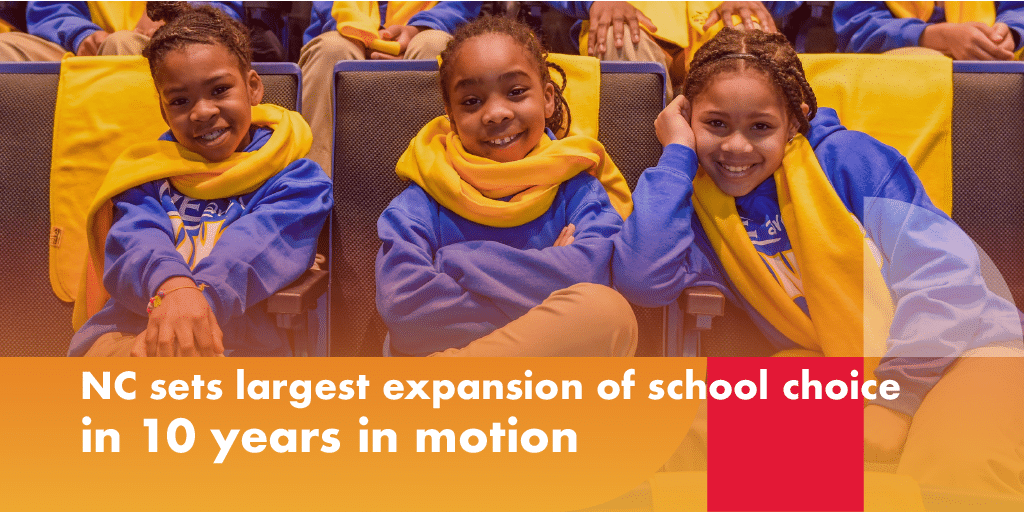Posted on Modified on Posted by National School Choice Week Team
North Carolina sets largest expansion of school choice in 10 years in motion

Do you live in North Carolina and attend private school or hope to in the future? Thanks to the state’s new budget, all families will soon be eligible to apply for North Carolina’s Opportunity Scholarship program. This program provides scholarships for students’ private school expenses, including tuition and book fees. Once the scholarship expansion is in effect next school year, the Tar Heel State will rank with Florida and Arizona in offering one of the nation’s largest school choice programs for families!
What’s changing about the Opportunity Scholarship program?
North Carolina’s Opportunity Scholarship program, originally enacted a decade ago for low-income students who wanted to choose a private school environment, has become a well-loved option for families. In the 2022-2023 school year, about 25,500 lower-income students used the scholarship program to choose the best learning environment for them. Now, lawmakers have expanded eligibility for the scholarship program to all students, starting in 2024.
While opening the doors for any family who chooses private school to receive financial support, the new program still aims to serve low-income families first and foremost. Low and middle-income students already receiving the scholarship will receive first priority for scholarship renewal next year. Then, remaining scholarships will be awarded to students on a sliding scale according to income. Students who qualify for free or reduced-price lunches (from a household with an income of less than $55,000 for a family of four) will be awarded scholarships first and will receive the largest scholarship amounts, up to about $7,400 for the school year.
If this change makes you newly eligible to apply for the scholarship, you may be wondering: “What amount of scholarship funding could my child receive?” Here are estimated scholarship amounts for families with incomes above the free and reduced-price lunch threshold:
- Students in households that make between 100% to 200% of the amount needed to qualify for free or reduced-price lunches can receive up to 90% of scholarship funding, about $6,600.
- If sufficient funds remain, students in households that make between 200% and 450% of the amount needed to qualify for free or reduced-price lunches can receive up to 60% of scholarship funding, about $4,400.
- If sufficient funds remain, students from households that make more than 450% of the amount needed to qualify for free or reduced-price lunches can receive up to 45% of scholarship funding, about $3,330.
Besides eliminating income requirements to apply, there are a few other ways the budget makes the private school scholarships available to more families. First, the bill increases funding available for the Opportunity Scholarship program, allowing more scholarships to be awarded each year. Second, the bill removes the requirement that an applicant must be entering kindergarten or have attended public school the previous year. Now, any K-12 student can apply, including current private school students or homeschool students who wish to switch to private school.
With these expansions and given the program’s budget cap, the Opportunity Scholarship program will be able to serve more than double the current number of scholarship recipients next school year!
What can an Opportunity Scholarship pay for? What can’t it pay for?
When a student is awarded an Opportunity Scholarship, they endorse their scholarship funds to the private school they are attending. Then, the private school receives a direct payment from the state on behalf of the student. Funds are primarily applied for private school tuition. However, the scholarships don’t have to stop there — they may cover fees for books, transportation, equipment, or other items required by the private school.
Currently, this scholarship program is limited to private school expenses. Families do not directly receive the funds and the funds cannot be used for home education expenses. While families choosing to homeschool are not currently eligible for the program, families enrolled in a microschool may be eligible, if the microschool is officially registered with the state as a private school and as a direct payment school.
Does your child participate in North Carolina’s Personal Education Student Account for Children with Disabilities program? Students with disabilities who receive an education savings account are still eligible for the Opportunity Scholarship; accessing both may help families afford both private school tuition (through the Opportunity Scholarship) and additional education therapies (through the education savings account).
How can I apply for an Opportunity Scholarship?
Private schools are a popular choice, often offering small class sizes or curriculum steeped in a religious or cultural tradition. Nearly 127,000 students currently attend one of North Carolina’s more than 800 private schools. While not every private school participates in the Opportunity Scholarship program, more than 600 do. Are there schools you’re interested in that participate in the scholarship program? To find out, check the list of participating schools at the North Carolina State Education Assistance Authority.
To apply for a scholarship, families should head to the North Carolina State Education Assistance Authority. Applications can be completed online. New student applications are accepted starting February 1, and priority applications are due by March 1.
If selected for a scholarship award, families may be asked to verify their household income, as well as their choice of private school. Once participating, families will receive offers annually to renew their scholarship. If a family decides to transfer between schools, their scholarship award can be sent to their new school, as long as it is one that participates in the program.
Families who are applying to the scholarship program should keep in mind that, along with expanding the scholarship program, the new budget adds accountability requirements. For example, if your student is a scholarship recipient in third grade or eighth grade, they will be required to take a nationally standardized test chosen by the North Carolina State Education Assistance Authority. More details on this requirement will be available soon!
Does this impact me if I love my public school and plan to keep choosing it?
The budget also makes a few key updates for public school students that you’ll want to know about. For example, it launches a new track for high school students at traditional public schools and public charter schools in North Carolina who wish to complete credits and graduate in three years.
To encourage participation in this accelerated track, the bill creates the Early Graduate Scholarship Program, a scholarship for those who graduate early from public high schools. North Carolina students who graduate from a public high school within three years of entering ninth grade and who submit a FAFSA may be eligible to receive one of these scholarships. Early graduate scholarships will help cover tuition costs at an eligible college, such as a North Carolina community college.
If your child attends a public charter school or you are considering a charter school for 2024-2025, you may be interested in ways the charter landscape is changing. This year, North Carolina lawmakers created a new Charter School Review Board with the power to grant, renew, and terminate charters in the state. The state budget affirms that the review board has this authority. This signals more flexibility for charter schools looking to open in upcoming years, and more access to charter options for families.
Finally, here are a few more budget highlights that may impact your child’s learning experience:
- The budget increases funding for North Carolina’s education student accounts for children with disabilities.
- The budget includes an average 7% increase in teacher pay for the next two school years, as well as funding for students who are studying to become teachers.
- The budget includes school safety grants, plus investments in salary supplements for school counselors and nurses, and additional school health personnel positions.
- The budget helps offset the costs of reduced-price meals for more students.
Where can I learn more?
Together, these public and private education changes represent one of the biggest expansions of education options for North Carolina families in the past decade! North Carolina is in good company as it expands K-12 options for families— 19 other states have already said “yes” to expanding school choice in 2023. Now, nationwide, more than a third of K-12 students are eligible for a state-run private school choice program. Besides making private school more affordable, states have expanded public school transfer options, created more flexibility for homeschoolers wanting to take part-time courses at local schools, and improved online learning options.
If you live in North Carolina and are looking for help in navigating your school options, reach out to Parents for Educational Freedom in North Carolina for support. You can also explore North Carolina’s learning options with NCSchoolsAroundMe.com, the state’s school finder website.

